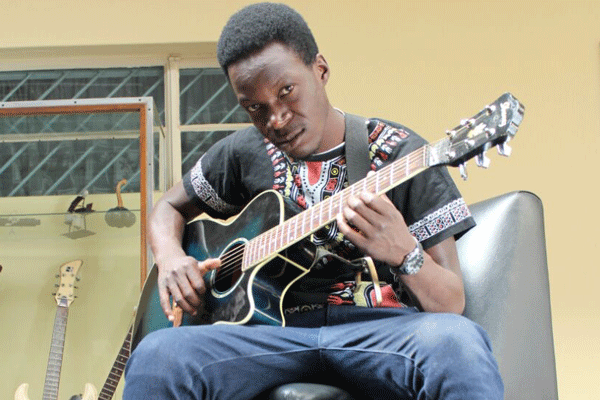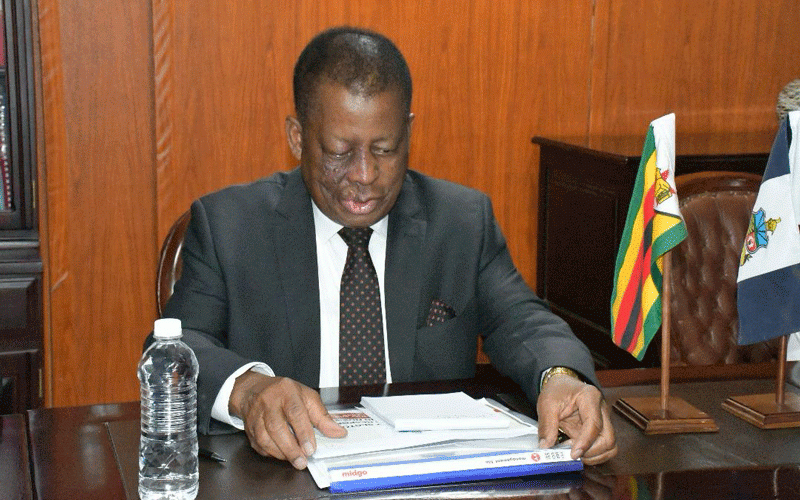
The story of the Chinese bamboo seed, which takes five years trapped in the soil before it pops out to grow 90 feet tall over a six-week period resonates perfectly with the chronicles of Afro-jazz musician Mbeu’s career.
The style interview with Kennedy Nyavaya
Born Ashton Tapiwa Nyahore, the Pakare Paye Arts Centre prodigy, who for eight years honed his musical skills under the tutelage of the legendary Oliver Mtukudzi, is now making mega strides in the music sector.
After releasing his debut album titled Hatizvimirire, the 26-year-old is back with a 10-track sophomore project named Hatikendenge, a declaration of his approach to the troubles he is facing in the music journey.
His entry into music is a tale of determination meeting hard work with a dose of teenage passion influenced by the talent of like-minded peers.
Of late, the Mhodzi Tribe Band leader has been staging top-notch live performances while his frequently released music enjoys high rotation on different mainstream platforms locally and regionally.
The Standard Style’s reporter Kennedy Nyavaya (KN) caught up with Mbeu (MB) to get an account of where he is coming from and future prospects in his fledgling career. Below are excerpts from the interview.
KN: Briefly tell us about your career journey and how you ended up in music.
- Chamisa under fire over US$120K donation
- Mavhunga puts DeMbare into Chibuku quarterfinals
- Pension funds bet on Cabora Bassa oilfields
- Councils defy govt fire tender directive
Keep Reading
MB: I started off as a church choir master in Norton and I was there for about two years doing choral music, but from primary to secondary school I never did music, it just started when I finished my Ordinary Level studies. That was when I saw that I was enjoying it, so I proceeded to do secular and that is when I went to Pakare Paye Arts Centre. I went there trying to discover myself and I did because I became part of a band called Tsvete with which I did an album titled Vavhimi although I was later kicked out in 2015.
KN: What had happened?
MB: What Dr Mtukudzi does during the mentorship is he chooses individuals to tour with and that was my case in some instances, so the group was not okay with the idea to the extent that it became a big issue to them as they felt I wanted to start a solo career.
KN: How was your transition from Tsvete into a solo career?
MB: It was so painful because of the fact that the group was my entry into the music life and I did everything with them wholeheartedly. They were my friends as well so it was not easy for me, but luckily God had His own plan for me. I had to accept where I was and I had to move forward, so ever since then till now I have never looked back.
KN: Since you had not planned on being a musician in the earlier stages of your life, how did the decision to pursue music full-time come about?
MB: My parents passed away when I was a Form One student so as the first born I was left with young siblings. I had to make a quick decision of what direction I wanted my life to take. It did not take me long to make the decision that I wanted to be a full-time musician once I started noticing that it was a lucrative occupation during my days as a choir master.
KN: After leaving the auspices of church choral music into secular, how did you develop the skill of writing music?
MB: I am a person who used to listen to lots of music and that helped me a lot in my first days of attempting to write. At first it was hard trying to put words together, but as time went on it came as a feeling and that is how it has been to date. What I want is to positively change other people’s lives through music because basically music is something that builds or destroys, so we (musicians) have a huge mandate to either mould or break our society (and) that is what inspires my lyrics.
KN: You have been releasing lots of music of late topped off with two albums in six months, is this what should be expect of you going forward?
MB: This is official, expect even four albums next year if all goes according to plan and by God’s grace we are still alive. Why should we stop? As a musician, I believe if one is a true artiste there is nothing like running out of lyrics, so I am evolving and I want to keep on maturing, which is what I cannot do while producing one album per year.
KN: Your mentor Oliver Mtukudzi has more than 60 albums, could this frequent release of music be inspired by him?
MB: What I take from him is the issue of originality and he always says ‘there is no better you than you’ which is what I will never forget. This means in making music I have to be myself and I am someone who is not stiff in creating stuff and I can create any time because it is something that I love and enjoy doing, so I will continue to do it when I still can.
KN: If Mtukudzi was to look at what you have achieved so far, would you say he is proud?
MB: I think he is happy that I am standing on my own as someone whom he has mentored, not that I am driving myself away from the Tuku Brand, but one cannot grow while grounded at home. Since I started I have not been sitting on his shoulders even though he is my mentor, I have been working with him for more than eight years, but I only have a single collaboration with him, which is even not yet released. This is to see if people can appreciate my music without his attachment, which they have and I am grateful.
KN: At Pakare Paye Arts Centre, what are some of the lessons you picked that have impacted your career?
MB: The mentorship we got there was not that you sit down and he teaches you everything, but he gives you space to show what you have and the main trait he encourages is originality.
KN: Many young artistes are struggling to establish a brand like you have. What would you consider the ingredient for you to have gotten where you are? Would you say your success is as a result of talent or hard work?
MB: It is hard for a humble person to say that they are talented, but I would say, quoting from Dr Oliver Mtukudzi’s words, not only your talent will take you there. It is a matter of hard work, humbleness and character, these all contribute. I can mention a whole lot of talented artistes who went down the drain yet they had the talent.
KN: While we are still on the issue of character, there has been scandals that have been associated with your name and brand, how do you stay clear of that?
MB: For me, Mbeu’s life as an artiste and Ashton Tapiwa Nyahora are different and we are talking about two different people, so basically, I have learned that I cannot combine the two. I am a father who has a daughter and a family who see Ashton, but when I am on stage Mbeu comes and does his thing. There is two lives there, but there are times that people make their own expectations about who Mbeu is yet what they see on stage is all there is and Ashton has his own life.
KN: Your rise in the music sector has been meteoric, have you sat down to think about what you want to achieve as a musician?
MB: My goals are set by the hard work I put into the field, which also determines what I will be tomorrow. It’s so even with my team that we are working to take our music to platforms that we have never gotten to. We will keep on working hard, we have no satisfaction like saying we want to go international and it ends there because it is even bigger than that.
KN: Would you say you are happy with where you are right now?
MB: I am very happy because for me I have advanced coming from a group where we used to do things in a particular way, now it is different and new. Like I said, it is an unending process of learning but it is exciting. I cannot say I am satisfied as yet with the achievements, I am just happy that God gave us a space to do what we did in the period that we did, but now we will deliver more.
KN: Looking at the short-term goals, what can your followers expect from you in 2019?
MB: From now going forward people should expect a lot of content from us and everything they think is huge in the music industry because we are saying we want to take it to an international level, so next year we are targeting that we release not less than three or four albums. It is going to be a routine because this is our job, so why must we rest when people need to be entertained and informed?
KN: There are a lot of young artistes who are probably looking at your career and only wishing they could get where you are, what would be your advice to them?
MB: It’s not easy at all, but what I can say is when people are working it sometimes gets painful resulting in blood, sweat and tears. One has to get into this with a clear mind and set goals so that even when people start praising you, you personally know the amount of work that you are putting in and it will not get into your head too much.
KN: Finally, what drives your work ethic?
MB: It is the passion and knowing that this is work, I have seen that some of us as artistes end up getting caught up in scandals because of aiming for toxic fun, which comes with fame. For me, the only way to safeguard oneself is keeping it professional always.











